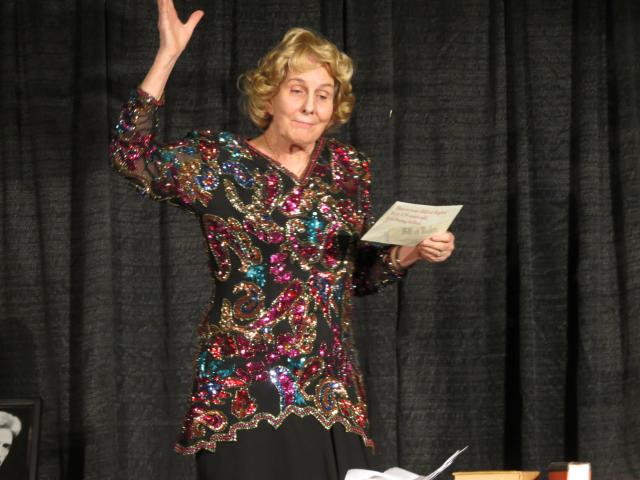
Using many of Lillian Hellman’s own words, Jenny Aldrich orally recreates a memoir by the American dramatist, screenwriter, sometime essayist, political activist, and autobiographer. As a woman, Hellman enjoyed unusual success for her writing, yet she was as well or even better known for being the lover of mystery writing novelist Dashiell Hammet. In Lillian, Aldrich assumes Hellman’s persona as if on an evening before she will be honored at an important committee dinner meeting. Aldrich’s Hellman is in her later days but looking as good as she’d ever been in a sparkling multicolored tunic over a black evening skirt and wearing heels. Her hair is as blond as in her younger days, of which she’ll produce a few pictures. For the occasion, she has put aside cigarettes on a small side table. On the central wide one in front of her are magazine covers and other pictures of her, plus a citation or two. A number of notebook-sized colored reproductions of posters advertising films made from Hellman’s plays she will use to illustrate her words about them. Most of Hellman’s conversation concerns her plays that got to Broadway or into film. She covers the genesis of each and its reception. A possible surprise: Dashiell Hammet’s assessment of The Autumn Garden as her best play. It became her favorite. Aldrich goes into Hellman’s testimony before the House on Unamerican Activities Committee but in less detail than might be expected, considering its lasting positive effect on her image and reputation. Instead, money problems and those with Hammet come up more frequently in the second half of Aldrich’s program. She tries to explain away her failure with Leonard Bernstein and her book for Candide. She doesn’t explain her rapacious take-over (still in effect after her death!) and changing of Emmanuel Robles’s “Montserrat” in a supposed adaptation. Instead, she glories in her National Book Award and the success of “An Extraordinary Woman,” her autobiography. Hellman’s definitely on the wane in love (with a much younger man) and literature in her later days. She conducted a feud with women who criticized her, but Aldrich’s Hellman doesn’t go into the details. From beginning to end of Aldrich’s play, Hellman appears to attenuate her Jewishness, understandable if you know of what she did in her drama or if you have read about it in Meyer Levin’s accounts of how she influenced “The Diary of Anne Frank” adaptation first done on Broadway. Because Aldrich is justly famous for her solo interpretations of historically important women, especially artists, I think she must be still developing her dramatic portrait of Hellman. It’s okay now theatrically (although projections instead of pictures being held up would be better). The script, though, is not yet up to Aldrich’s usual standards.
